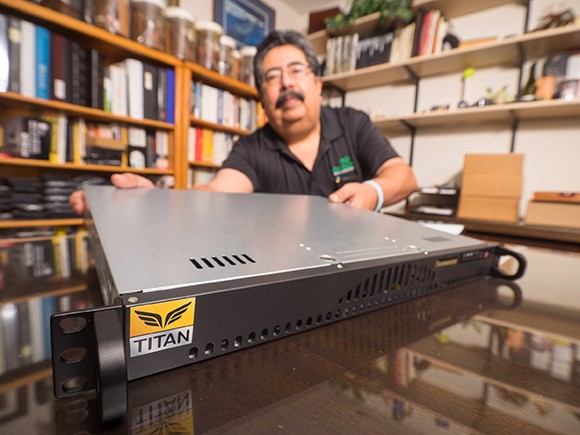Oasis counts on Titan: Tax credits will help add 357 jobs
IN THIS ARTICLE
- Latest news Topic
- Erika Martin Author
By Erika Martin Friday, January 30th, 2015

George Baldonado of Oasis Technology with the company’s Titan anti-hacking device. (Nik Blaskovich photo)
Oasis Technology, a Camarillo IT firm specializing in cybersecurity, grew its workforce by 50 percent last year. And that is just the beginning.
Thanks to corporate clients’ growing demand for security solutions and $2 million in California tax credits, Oasis plans to multiply its workforce nine-fold and create 357 jobs in the next three years.
The tax credits, announced Jan. 15, are part of a $31 million allocation from Go-Biz, the governor’s office of business development. Oasis is among 56 companies that will receive funds expanding and creating jobs in California.
At the end of 2013, Oasis had just 43 employees. It added 23 over the course of 2014 for a total of 66 but plans to accelerate recruitment even further, bringing on 65 this year to double its workforce. The terms of the credit require Oasis to make at least 357 new hires by the end of fiscal 2018.
Oasis Technology was founded by CEO George Baldonado in 1979 as a custom software outfit. It has since evolved to a multi-purpose hardware, software and IT firm that works with big-name clients such as Amgen and Verizon, which still uses software written by Oasis.
Baldonado said the company will first aim to escalate its sales and marketing efforts. It currently houses these operations in facilities across the Midwest, but Baldonado said the company is working to develop its West Coast sales team.
However, Baldonado said this expansion won’t even show up in its employee count since there is “no way of knowing for sure” what this dispersed and frequently shifting team amounts to.
But Baldonado does keep a close eye on in-house staff working in R&D, support and development programming that build the company’s devices. Oasis’ flagship product, the Titan anti-hacking device, gave it an edge over the other 286 tax credit applicants after a year of high-profile corporate breaches that dealt a blow to business in the state.
The Titan is a black box that users insert — with a downtime of only 30 seconds — between an incoming Internet connection and their existing network to monitor traffic and block hack attempts before they can even reach a firewall.
“We’ve actually found that we protect against hacking better than new-generation firewalls,” Baldonado said. “All the protection happens before the firewall starts, right as soon as that wire comes in from the Internet.”
Baldonado said the tax breaks came at the perfect time, when the Titan is still new in the field but has been fully vetted.
“People have used it and it’s actually working exactly the way we expected it to work,” he said. “Some of our customers don’t want to turn it off for any reason because it’s been so good at protecting their network.”
Early local adopters include the city of Camarillo, Saint Bonaventure High School in Ventura and BNK Petroleum, an oil company with operations in the region. Baldonado said the product has also been popular in Hollywood, and a major studio will soon go public with its partnership with Oasis.
The product has been rolling out in increments across the U.S. The company began its efforts in the Midwest, a region Baldonado said is neglected by the IT industry but in reality is more open to adopting new products.
He said efforts are now beginning to shift toward the east and west coasts, with plans to bring on staff for 24-hour support centers.
“We’re able to do a lot of development because hack attempts are changing, technology is changing — everything’s changing,” Baldonado said. “We have to keep up.”
But Baldonado said the whirlwind pace security specialists must innovate at to keep up with hackers is part of what he loves about his job.
“Keeping up with technology is fun, and the people we have here enjoy it as well. They all feel challenged,” Baldonado said, and as the company hires it will seek “people who feel just as challenged about innovating new technology.”
He said he expects new staff to come on very soon and already has a few candidates picked out. The new hires will put hands on deck for Oasis’ next project, Prometheus, a sister product to Titan that protects against attacks coming from within a network such as a virus.
While all within the company appears to be running smoothly, Baldonado said it faces a huge challenge from outside in businesses’ general cybersecurity apathy.
Oasis offers free network scans to tell companies whether their network is vulnerable and what the vulnerabilities are. But, Baldonado said, usually the company either doesn’t want the scan at all or ignores recommendations to address network weaknesses.
“We ask for permission, Baldonado said. “Hackers don’t ask for permission; they’re going to do it anyway. It’s getting customers to decide, ‘You know what? We need protection.’ ”
Baldonado said it ultimately doesn’t pay to be cheap or lazy.
“Our product is so simple, they don’t have to do anything. We do everything for them. They’re afraid of doing anything,” Baldonado said. “It’s hard to understand. In light of Target and Home Depot and everyone that’s been hacked, the smaller businesses will start getting hacked.”
California Competes was created in 2013 to replace the state’s Enterprise Zone program. This is the initiative’s second fiscal year and the first of three application periods scheduled for fiscal year 2014-15.










